
RESPONSIBLE CONSUMPTION AND PRODUCTION
According to latest projections of the UN, the global population could grow to around 8.5 billion in 2030, 9.7 billion in 2050. The equivalent of almost three planets could be required to provide the natural resources needed to sustain current lifestyles. However, the resources on planet earth are limited and the onus of responsible consumption and production will hold the key for our survival. Sustainable consumption and production demonstrate “Doing more and better with less.” Sustainable consumption and production can contribute substantially to poverty alleviation and the transition towards low-carbon and green economies.
Nitte DU is confident of impacting its young pupils and its employees in channelizing their spirit of learning with a conviction for change. It is constantly guiding the talent pool towards responsible conduct while engaging in teaching- learning, research, innovation or enterprise. The responsible conduct in adopting environment friendly methods of conservation of natural resources of air, water, food and energy.
NITTE DU ADMINISTRATION AND ECO-FRIENDLY MEASURES:
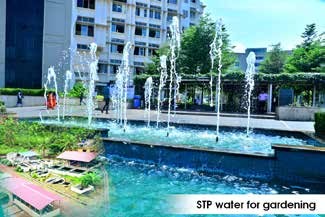
Paper usage is minimized and the University has developed an online information system which reduces paperwork. Student records are maintained online.
Use of eco-friendly materials that are recyclable or made from recycled material is encouraged by the purchase department. A prudent purchase department is functional and proactive in reduction of redundancy in purchase and under- utilization of material as well as equipment. Required materials are indented by the material- in-charge of that particular department and is approved by the Head of the department and the institution, materials are then received from the store with the bill and distributed to the concerned. Regular audit and stock checking ensure proper usage of all resources.
Nitte DU maintains a research equipment directory, it is displayed for public benefit on the website https://nuresdir.wordpress.com/ This enable all potential users on and off campus to be aware of the resources available on campus for responsible usage of equipment and prevents redundancy in purchase and outsourcing.
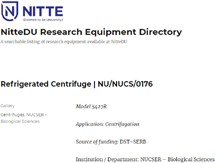
NITTE DU AND WATER CONSUMPTION:
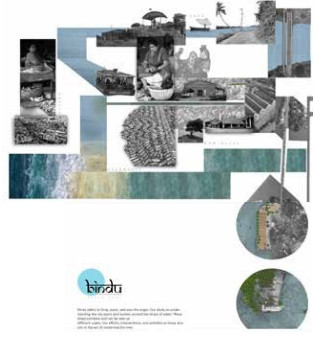
The University is proactively involved in water conservation mission. It has adopted environmentally friendly methods for water conservation and optimum utilization of water. Recycled water is used for maintaining the lush green landscape all-round the year. Rain water harvesting is adopted in all its campuses. Utilisation of open wells and water bodies for rainwater harvesting is practiced. Open wells are the preferred source of water in place of borewells. Its policies and strategies are focused on protection, conservation and sustainable use of its precious freshwater resources. Image courtesy: Bindu river park project, NIA The grey water generated is recycled and reused for gardening, washing vehicles and flush water
in all toilets of the campus.

NITTE DU AND ENERGY PRUDENCE:
Conventional light fittings are replaced with energy saving lights in a phased manner. They help in reduced running cost and life of motors in critical areas. Solar panels are installed on all campuses to generate electricity and also to contribute towards green initiative. Additionally, solar water heaters are installed in all hostels.Periodical Maintenance/AMC of all electrical equipment including panels is undertaken by the maintenance department. All AC’s which are beyond economical repair are replaced with 5-star inverter AC’s. Replacement of normal lights with long lasting LED lights to reduce electronic waste. Installation of educative signage’s towards conservation of energy near all exits of classrooms and offices. With a view to contribute towards green initiative, the University has entered into an open access agreement for Hydro & Wind energy with M/s. AMR Power Pvt Ltd, M/s. Doddanavar Global Energy Pvt Ltd and M/s. Brindavan Hydropower Pvt Ltd. For all new installations XLPE UG cables are being used which helps in maximising cable life and reduce expenditure. FRLSH copper wires are being used at all new installation. All old main panels in installations are being replaced in a phased manner with Single phase, Under / Over voltage protection switchgear products. Timers have been installed at various locations for switching on/ off of security lights which helps in minimising energy consumption.
NITTE DU AND FOOD ON CAMPUS:
Community health and wellbeing is dependent on food. The institution provides healthy food in hygienic atmosphere to all stakeholders on campus. The University constantly reminds the stakeholders on reduction of food wastage and the importance of nutrition.Educational information is displayed and played on the video at the hostel mess. The waste generated by the common kitchen is used for biogas production and the hostel mess waste is collected by a vendor who maintains a piggery. The manure produced by the piggery is used for horticultural purposes.
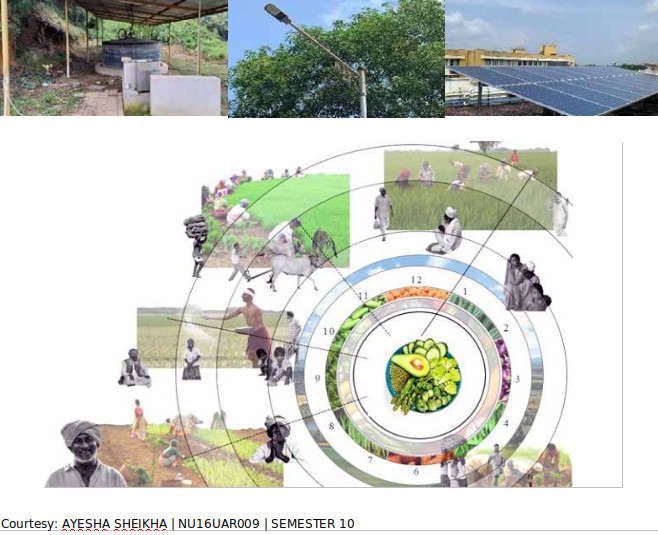

Nitte DU Waste management SYSTEM:
Solid waste: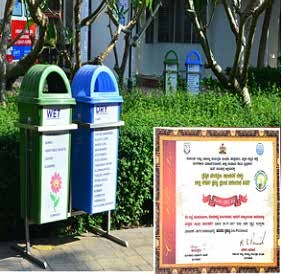
The University generates approximately 28.1 Ton/A. The wet waste and dry waste is sorted at source. Recycling of organic waste is done by the biogas unit to utilize common kitchen waste. Strict compliance with provision for disposal of bio medical and electronic waste. Re-using of scrap material is practiced. Restrictions on use of bottled water to reduce plastic waste. Encouraging use of eco-friendly materials in construction. Use of paper/plastic cups/ bottles is strongly discouraged. Board rooms are equipped with water filters and dispensers to avoid bottled water. Paper waste is sent to an external recycling unit vendor. Double-sided printing option is being used at terminals with access to printers. Waste segregation is being carried out; organic waste is composted in-house and the manure generated is used for the gardens in the campus. The wet waste is put into the composting pit.
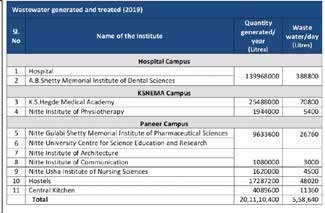
and dry waste is disposed using the incinerator. Segregation of waste is done at source in the hospital, laboratories and common areas. Dedicated bins for waste management are made available - Green for degradable; Blue for plastic and metals; Red for e-waste and batteries. Bins are placed in prominent positions in each campus with instructions clearly displayed for public awareness. Hazardous chemicals used in laboratories are collected safely and disposed of through an authorized vendor. The hazardous fumes and solvents generated in laboratories are handled by the fume hood and the carcinogenic substances are handled with additional care and stored in a respective allotted place with the signage label “Carcinogenic”. Used oil, oil- soaked cotton waste and filters containing used oil from vehicles and machinery – these are disposed of through an authorized vendor. An incinerator with a carbon scrubber is available for safe disposal of selected inorganic wastes. Strict compliance with provision for disposal of bio medical and electronic waste.
Liquid waste:
Sewage Treatment Plants (STP)s are installed on all the campuses of Nitte DU. Effective utilisation of treated water is ensured. Additionally, dual plumbing lines for toilets has been catered to in all buildings.
Hazardous waste:
Chemical and hazardous waste from laboratories is being sent to a certified agency (RAMKY) for processing and no part of the waste is disposed elsewhere.
Biomedical waste:
Biomedical waste is handled by a specialized waste disposal agency authorized by the Government Pollution Control Board (M/s RAMKY Energy and Environment Ltd.). Chemical and hazardous waste from laboratories is being sent to a certified agency (AYUSH) for processing and no part of the waste is disposed elsewhere. The generated electronic wastes (e-waste) will be collected in e-waste collection (Hospital ite of the campus) and maintained by the maintenance department. Auction notice will be sent for Recyclers/Reprocessors registered under Central Pollution Control Board, Govt of India for Electronic waste. The air quality on campus is regularly monitored to enable the habitants of quality air to breath and thrive. An aggressive tree planting drive by the faculty and students of the University is working towards reducing ones carbon footprint.


.png)